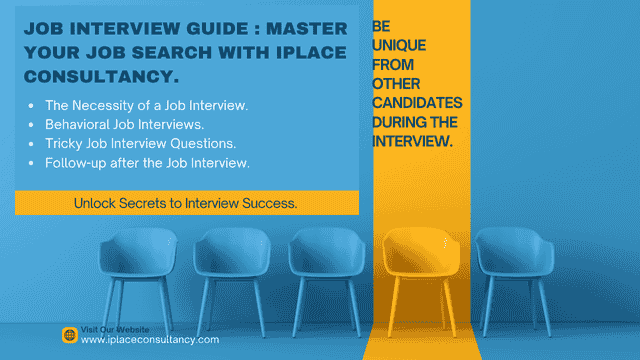Master the Art of Job Interviews : A Comprehensive Guide by IPlace Consultancy
Job Interview Guide: Master Your Job Search with IPlace Consultancy

In today's competitive job market, an interview helps you advance in your career. Nevertheless, going to the interview itself is not enough; success in it will determine whether you get the job or not. This is where IPlace Consultancy can help you navigate through the interview process, equipping and personalizing you with the strategies that will bring success your way. Due to years of experience in bringing job seekers and potential employers together, you can rely on IPlace Consultancy for trusted partnership with your career.
This is an extensive guide for you to read on all aspects pertaining to a job interview-from preparation to follow-up-and some valuable tips from experts at IPlace Consultancy that will help you land your dream job.
⇒ The Necessity of a Job Interview:
It is not just a testing time for your skills but also an exercise where the potential employers want to see how well you fit into their company's culture. Make that impression last and show them why you are the ideal candidate for the position through that job interview.
IPlace Consultancy believes that preparation for a job interview largely determines success in an interview with an employer. Employers want candidates, not only with technical competence but also capable of adapting, coordinating with others, and positioning themselves to become a good fit for the mission of the company. Among all the steps toward proving you're just the right person for the job, the job interview is perhaps the most crucial one.
Preparation is the root of acing any job interview. It means one needs to do homework beyond just walking into a room and answering questions asked. According to IPlace Consultancy, here are the steps that need to be followed in order to prepare for a successful job interview:
Research the Company:
Learn about the history, the mission and values of the company, and its most recent achievements. These may show that you are interested in the job and the company on the whole. You may refer to the website of the company, social media, and industry news sources for this.
Job Description:
Prepare ahead of time by reviewing the job description carefully. Look for high-lighted important skills/qualifications that an employer may be looking for and prepare examples from your work experience that demonstrate those abilities.
Common Job Interview Questions:
At nearly every job interview, many questions come up. Practicing beforehand will help you to make confident and articulate answers to the most common questions. The most common ones are "Tell me about yourself," "What are your strengths and weaknesses?, " and "Why do you want to work here?" Prepare Your Questions for the Interviewer
A job interview is a two-way street. Preparing insightful questions for your interviewer shows that you are engaged and taking the opportunity seriously. You might ask about company culture, growth opportunities, or how success is measured in the role.
Mock Interviews:
At IPlace Consultancy, we actually simulate the experience of the actual interviewing process. Mock interviews improve body language, tone, and response of the candidates. At IPlace consultancy, we indeed believe that mock interviews are one of the most important preparation tools because they actually enhance the actual performance in the interview.
⇒ The Job Interview: Some Tips by IPlace Consultancy:
The day of a job interview is very stressful, but at the same time, I believe that if someone prepares well and is in the right mental preparation, they might come out with flying colors. Here are some tips from IPlace Consultancy for acing the interview:
Appropriate dress:
First impression is key. You should be dressed formally and according to your employer's wish. Determine the kind of culture the company has so that you can know whether to wear a formal or business casual attire.
Body language:

Your body language says a lot in an interview. Make lots of eye contact, give a firm handshake, and sit straight. Be mindful of any nervy habits such as tapping your foot or fidgeting, so you don't draw the interviewer's attention to what he is trying to talk about.
Be a Listener:

During the job interview, a person should listen carefully to the question asked by the interviewer before responding. Most people ask and then jump into answering without being fully assured of what the questioner wants them to say. Allow yourself time to organize the question and then respond appropriately.
Show Interest:

The employers want to hire people who are passionate about the opportunity. Let them know how excited you are for the job and the company. Be clear about why you think you are the right fit and why the job excites you.
Sell Yourself:

The interview is your chance to expose your skills, experience, and qualifications. Do not hesitate to emphasize your achievements and how they might relate to the job. Use examples from past experience to demonstrate just how you might succeed on the job.
⇒ Behavioral Job Interviews:
Most companies use behavioral interviews in evaluating the candidate's ability to solve different scenarios. IPlace Consultancy readies the applicant on what kind of interview to expect by training to tell the story using the STAR method which includes Situation, Task, Action, and Result. Here's how to do it for each step:
-
Situation: Give a situation that you faced in your previous job.
-
Task: Explain the task or challenge
-
Action: Explain what you did in response to the challenge.
Outcome/ Result of what you did which you would want others to share
Through STAR, one can communicate how he or she solved a problem or handled a tough situation in a clear and structured manner.
⇒ Tricky Job Interview Questions:

Some job interviews throw up tricky questions or ones that are simply not expected. IPlace Consultancy teaches us how to come across as confident when presenting our coping mechanisms for dealing with tough questions. Here are a few examples:
"What is your greatest weakness?
When asked about your weaknesses, choose something that is not critical to the job and then tell how you are working to enhance it. For instance, you could say, "I sometimes focus too much on the details, but I've learned how to balance focusing on the details with meeting deadlines."
"Why should we hire you?
This is a chance to reiterate your qualifications. Emphasize in what way you are unique, and how these can meet the needs of this organization. Be specific about in what ways you are different from others.
"Tell me about a time you failed?
For sure, failure is life, and employers know that. Therefore, when answering this question, the important thing would be to show how you learned from the failure, how you applied those lessons, and how you have improved or will improve in your career.
⇒ Follow-up after the Job Interview:

The efforts should not stop there after the job interview. Follow up with a thank-you note or email. This is the professional courtesy to show you appreciate the interviewer's time and have respect for his or her schedule. According to IPlace Consultancy, it is advisable to send a follow-up message within 24 hours after the interview.
Express appreciation to the interviewer, repeating that you are interested in the position, and then reiterate something important that was discussed during the interview as a reinforcement of how well you would fit in the position. Such a small courtesy may be remembered.
⇒ How IPlace Consultancy Can Help You Succeed:
We at IPlace Consultancy believe each job interview offers a career opportunity. Our team of experts provides you with customized preparation services such as:
-
Resume Review and Optimization: Creating your resume to stand out to the employer.
-
Interview Coaching: Our coaches guide you through mock job interview sessions with feedback and tips for improvement.
-
Job Finding Assistance: We will connect you with potential employers and help you to find the job that's right for you, based on your skills and experience.
-
Career Counselling: We also provide career counselors who guide you through a definition of your career aspirations and a plan for how you intend to achieve them, whether you are coming to work for the first time or changing your career.







